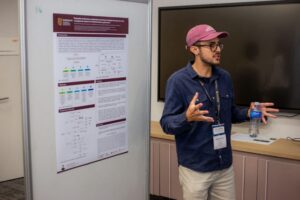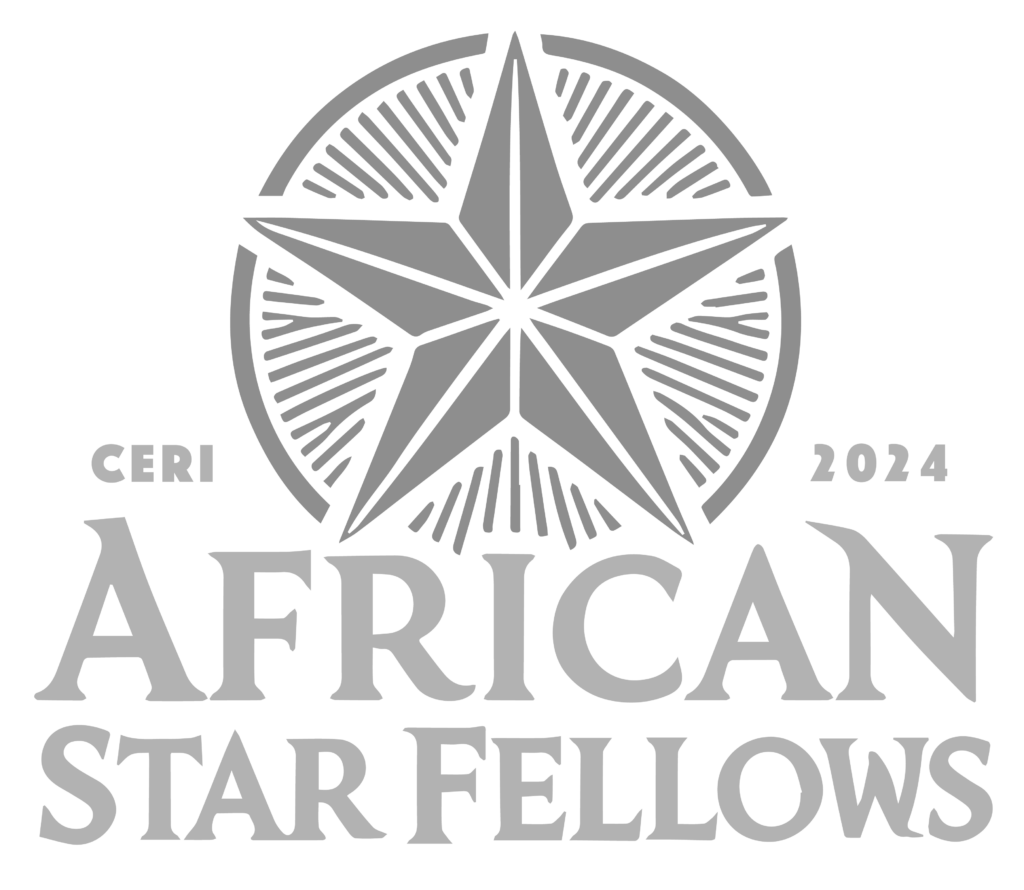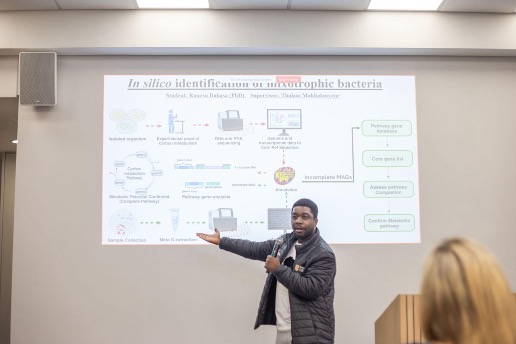Les premières Journées de Recherche CERI-SACEMA, qui se sont tenues du 27 au 29 novembre 2024, ont réuni des étudiants, des chercheurs et du personnel pour trois jours d'échanges scientifiques et d'apprentissage. Les discours d'ouverture du Prof. Francesco Petruccione et du Prof. Thulani Makhalanyane ont donné le ton collaboratif, soulignant comment différentes disciplines scientifiques peuvent travailler ensemble pour relever des défis de santé complexes. La première journée a été axée sur le développement professionnel à travers des ateliers ciblés portant sur l'engagement médiatique, le branding personnel sur les réseaux sociaux, les outils de recherche en intelligence artificielle et la gestion de projet. Ces sessions ont doté les participants de compétences pratiques essentielles pour les carrières scientifiques modernes.

Les présentations, orales et par affiches, ont mis en évidence l'étendue des recherches menées au sein des groupes de recherche CERI-SACEMA. La surveillance virale a émergé comme l'un des thèmes, avec des études allant des techniques COVIDSeq modifiées pour le suivi de la grippe à l'analyse de la charge de morbidité du SARS-CoV-2 en Afrique du Sud. Des travaux connexes ont examiné la génomique de la dengue et du virus du Nil occidental à travers l'Afrique, soulignant l'importance de la surveillance des maladies à l'échelle continentale.
La recherche sur le VIH a occupé une place importante, avec des présentations explorant les schémas de suppression virale, l’impact du traitement par dolutégravir et l’évolution du VIH dans les communautés rurales africaines. Une étude particulièrement intéressante a examiné comment le VIH affecte le microbiote intestinal chez les femmes en post-partum, reliant la recherche clinique et sur le microbiome.
La recherche en santé environnementale a démontré l'interconnexion entre le bien-être humain et les systèmes écologiques. Les études ont exploré le microbiote dans divers environnements résidentiels, des établissements informels aux zones urbaines, tandis que d'autres ont examiné les processus microbiens dans les écosystèmes marins et désertiques. Ces travaux ont souligné comment les facteurs environnementaux influencent les résultats en matière de santé publique.
Le projet africain sur le microbiome a présenté des résultats susceptibles d’influencer les politiques continentales, tandis que les études sur la résistance antimicrobienne dans les eaux usées urbaines ont mis en évidence de nouveaux défis pour la santé publique. La recherche sur les maladies amplifiées par le climat a démontré comment les changements environnementaux affectent les schémas des maladies, soulignant la nécessité de stratégies de santé adaptatives.
Les présentations d'affiches de deux minutes ont mis les présentateurs au défi de communiquer des idées complexes de manière concise, suscitant des discussions qui se sont poursuivies entre les sessions. Ces interactions ont souvent révélé des liens inattendus entre différents domaines de recherche, allant des études moléculaires aux interventions en santé des populations.
La réunion s'est terminée par un débat sur la science interdisciplinaire dans la recherche en santé, où les participants ont partagé leurs expériences pour rapprocher différents domaines scientifiques. La conversation a souligné comment la combinaison de perspectives issues de diverses disciplines conduit à des solutions de santé publique plus complètes.
Pour de nombreux étudiants, les Journées de Recherche ont offert leur première opportunité de présenter devant un large public scientifique. L'environnement bienveillant a favorisé les retours et les discussions, tandis que les ateliers ont fourni des compétences pratiques pour leurs carrières en recherche.
Alors que les premières Journées de Recherche touchaient à leur fin, il était évident que le CERI-SACEMA avait créé bien plus qu'une simple réunion – ils avaient favorisé un environnement propice à la collaboration scientifique. L'événement a démontré comment rassembler des approches de recherche diverses peut stimuler l'innovation dans la recherche en santé, posant une base solide pour de futurs rassemblements.

